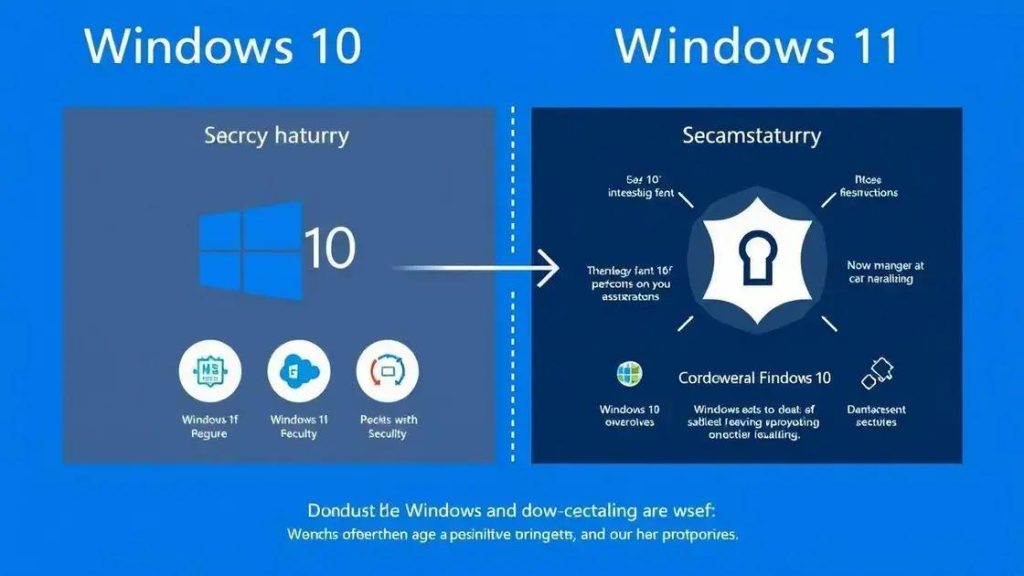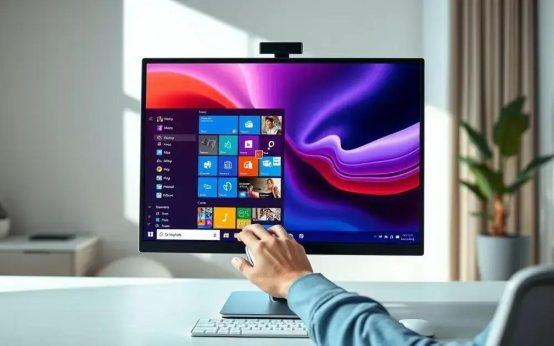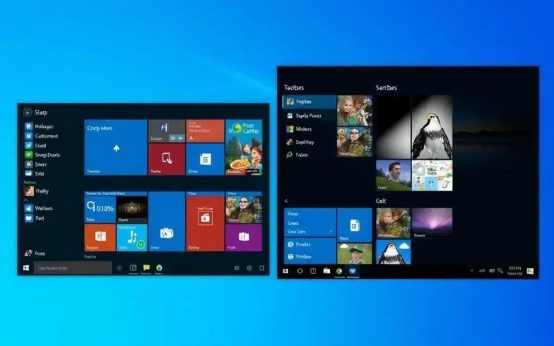Using an outdated operating system exposes users to significant security vulnerabilities, performance issues, and compatibility challenges, making it crucial to upgrade to ensure safety and efficiency.
Windows 11 has made significant strides recently, surpassing its predecessor in user base. But does that mean you should upgrade?
adoption rates of windows 11

The adoption rates of Windows 11 have been steadily increasing since its release. Many users are excited about the new features and improvements that enhance productivity and security.
What Are the Latest Adoption Statistics?
As of recent reports, around 20% of Windows users have upgraded to Windows 11. This number is expected to grow as more devices meet the system requirements.
Factors Influencing Adoption
Several factors contribute to the adoption of Windows 11. Users appreciate the enhanced interface, improved snap layouts, and integrated Microsoft Teams. Another influential aspect is the automatic updates, which ensure that users receive the latest features and security enhancements seamlessly.
Comparing Adoption to Previous Versions
When comparing to previous versions, Windows 11 is adopting faster than Windows 10 did at an equivalent stage. This can be attributed to the increased demand for better performance and user-friendly designs in operating systems.
Organizations are also pushing for upgrades due to the end of life for Windows 10 support, emphasizing the need for transitioning to maintain security standards.
Implications of Low Adoption Rates
If adoption rates remain low, businesses may face security vulnerabilities and limitations with software compatibility. Staying updated is essential for optimal performance and access to the latest features.
As more users upgrade, it’s likely that discussions around the benefits of Windows 11 will continue, encouraging others to make the switch.
the importance of security updates

The importance of security updates cannot be overstated, especially with the rising threat of cyberattacks. Regular security updates are crucial for safeguarding your operating system and personal information.
Benefits of Security Updates
Installing updates can protect your system from vulnerabilities that hackers exploit. These updates fix bugs and enhance system performance, ensuring your device runs smoothly.
Staying Ahead of Threats
As new threats emerge, developers release patches to address them. By keeping your system updated, you stay ahead of potential risks and help protect sensitive data from breaches.
Automatic Updates
Most systems, including Windows 11, offer the option for automatic updates. Enabling this feature ensures you receive the latest security patches without needing to think about it.
Ignoring these updates can leave your system vulnerable. Many attacks target outdated software where known issues remain unaddressed. The best defense is a proactive approach to updates.
Impact on Performance and Compatibility
Regular updates can also improve compatibility with new applications and devices. Developers often optimize their software for the latest system versions, so staying updated helps maximize functionality.
Additionally, security updates often enhance the overall stability of your operating system. A system that is frequently updated is less likely to experience crashes or performance issues.
options for extending support on windows 10

Users of Windows 10 may wonder about options for extending support as Microsoft shifts focus to Windows 11. It’s important to understand how to manage your device effectively during this transition.
Understanding End of Support
Windows 10 will reach its end of support a few years after Windows 11 becomes the primary focus. This means no more updates, including security patches, which could leave your system vulnerable.
Upgrade to Windows 11
The most straightforward option is to upgrade to Windows 11. This ensures you receive all updates and support, along with new features that improve performance and security.
Staying on Windows 10 Longer
If upgrading immediately isn’t feasible, check your device compatibility with Windows 11. You might need to plan physical upgrades or replacements to ensure a smooth transition.
Be aware that while you can continue using Windows 10, doing so without updates can introduce security risks over time.
Using Extended Security Updates
Microsoft does offer Extended Security Updates (ESU) for organizations still using Windows 10. This program provides critical security updates for a limited time, guiding users until they can fully transition.
Maintain Software Compatibility
Consider evaluating and ensuring that your essential software and applications continue to run efficiently on Windows 10 for the time being. Communicate with software vendors about their support timelines to avoid disruptions.
should you upgrade to windows 11?

Deciding whether to upgrade to Windows 11 involves various factors that can impact your user experience. Here are key points to consider when making your choice.
System Requirements
First, check if your device meets the minimum system requirements for Windows 11. This includes having a compatible 64-bit processor, 4 GB of RAM, and 64 GB of storage. If your current system isn’t compatible, upgrading may not be possible.
New Features
Windows 11 introduces several exciting features that enhance productivity, such as Snap Layouts for multitasking and a redesigned Start Menu. These new tools can help you work more efficiently.
Enhanced Security
One of the significant benefits of upgrading is improved security. Windows 11 includes advanced security features like hardware-based protections that help protect your system from malware and other threats.
User Interface Improvements
The interface in Windows 11 is more modern and user-friendly, which can improve overall user experience. Changes like centered taskbar icons and rounded corners make navigation intuitive.
Software Compatibility
Before upgrading, consider any essential software you use. Some applications may require updates to work seamlessly with Windows 11. Check with software vendors to ensure compatibility.
impact of outdated operating systems

The impact of outdated operating systems can greatly affect both individuals and organizations. Using an unsupported system poses several risks and challenges that are worth understanding.
Security Vulnerabilities
One of the most significant risks of running an outdated operating system is security vulnerabilities. Without regular updates, your system becomes an easy target for hackers and malware, leading to potential data loss and breaches.
Performance Issues
As software evolves, newer applications may not run smoothly on outdated systems. This can result in performance issues, including slow processing times and crashes, making your work less efficient.
Lack of Support
When your operating system is outdated, you lose access to technical support from the developer. This can leave you struggling to solve problems on your own, further complicating your tech experience.
Compatibility Challenges
Older operating systems may have trouble supporting new software applications. This can hinder productivity, as you might be unable to use critical tools or services needed for your tasks.
Compliance Risks
For businesses, running outdated systems can result in compliance risks. Many industries require specific security standards that outdated systems cannot meet, leading to potential legal issues.
In conclusion, the importance of keeping your operating system updated
Staying current with your operating system is vital for security, performance, and compatibility. An outdated operating system can expose you to risks and slow down your productivity.
Upgrading to the latest version not only protects your data but also helps you take advantage of new features and improvements. It is essential for maintaining a smooth and safe computing experience.
Consider your options carefully, and don’t hesitate to make the switch when necessary. This will ensure that you are equipped to handle the challenges of modern technology.
FAQ – Frequently Asked Questions about Outdated Operating Systems
What are the risks of using an outdated operating system?
Using an outdated operating system can make your device vulnerable to security threats, resulting in data loss and breaches.
How can outdated operating systems affect performance?
They may cause slow processing times, crashes, and overall inefficiency, making tasks more challenging.
Will I still receive support for an outdated operating system?
No, once an operating system reaches its end of support, you will no longer receive technical support or updates from the developer.
What software compatibility issues might arise with an outdated system?
New applications may not run smoothly or at all on outdated systems, limiting your ability to use essential tools.
What should businesses consider regarding compliance and outdated operating systems?
Businesses could face legal issues if they fail to meet industry security standards due to outdated systems.
How can I ensure my system remains secure while using an older version?
Consider upgrading to a newer version or using Extended Security Updates (ESU) if available, to maintain security.


 Windows 11: Discover How to Remove Pre-installed Microsoft Store Apps
Windows 11: Discover How to Remove Pre-installed Microsoft Store Apps  Windows 11: Optimize Your PC with a Simple Debloat Script
Windows 11: Optimize Your PC with a Simple Debloat Script  Windows 11: Explore Exciting New Features and User Interface Changes
Windows 11: Explore Exciting New Features and User Interface Changes